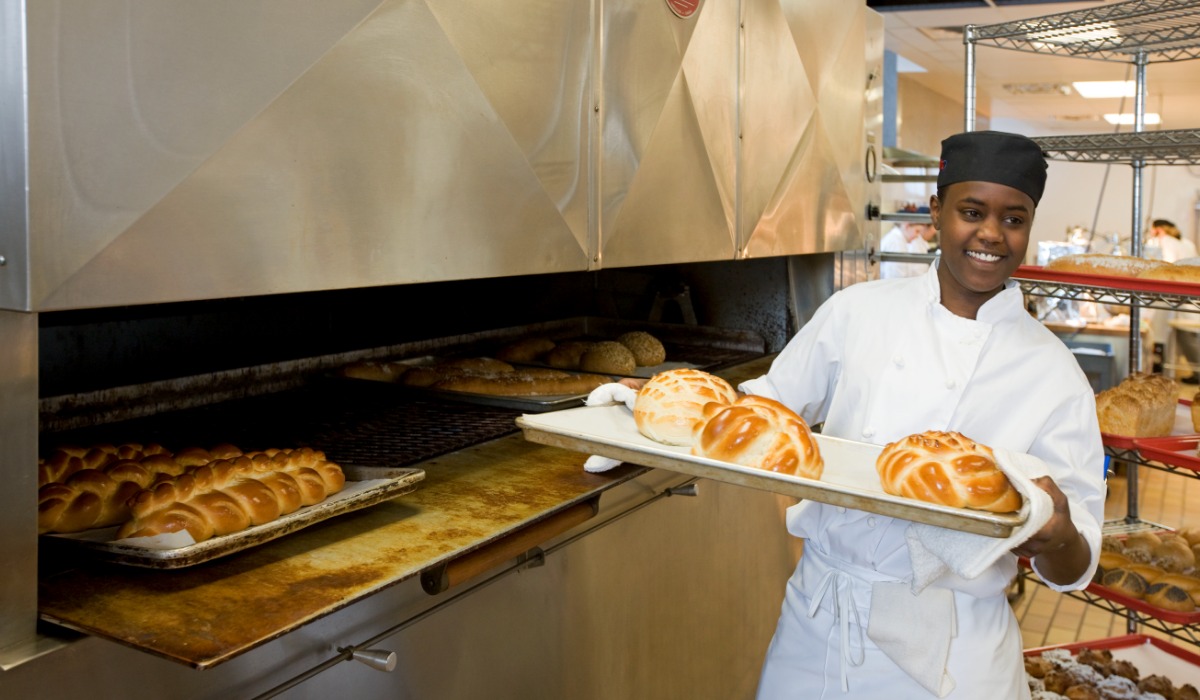Program update 2026
Interested in this specialization? Beginning in the 2026/27 academic year, students interested in our Hospitality and Tourism Management diploma will apply via the multi-disciplinary stream.
This stream will enable you to build your program from a selection of courses, including options across all the different specialization areas, subject to course availability.
Overview
Do you enjoy creating unforgettable experiences and bringing plans to life? Whether it's a lively music festival or a crucial business convention, the Hospitality and Tourism Management program specializing in Event Management can help you manage it all with finesse and professionalism.
This program prepares you for a fast-paced industry that values enthusiasm and adaptability. Gain a thorough understanding of the hospitality sector, paving the way for event job opportunities. Learn both theoretical knowledge and practical skills from experienced industry experts.
You'll develop your communication, problem-solving, and interpersonal skills while gaining expertise in guest experience, sales and marketing strategies, and leadership.
Dive into the world of event and meeting planning, learning about various event types, from large-scale conventions to intimate VIP events. You'll partner with industry leaders and bring events to life on and off campus, both large and small.
Other skills you'll gain include contracts expertise and event operations, project planning and costing. You'll learn how to negotiate with stakeholders and produce events that exceed client expectations. You'll become skilled at project management, drafting detailed plans to ensure events stay within scope and budget.
If you enjoy working in a team and collaborating to achieve common goals, this dynamic industry awaits you. You will be able to explore diverse job roles available worldwide. Roles include event or banquet operations roles, special events manager, wedding or event coordinator, and facilities or venue manager.
Eventually, you'll be ready for operations management, business development, and marketing roles. You could even start your own events or venue management business. The Hospitality and Tourism Management program specializing in Event Management will help pave your path to success in this exhilarating industry.
Those in event planning tend to be directive, social and innovative.
You need:
- excellent communication and presentation skills
- excellent organizational and time management skills
- problem-solving skills
- the stamina and energy required to work long hours
- the ability to negotiate and mediate
- the ability to work well with lots of different people
- attention to detail
- the ability to work well under pressure and make decisions quickly.
You should enjoy working with a variety of different people and organizing and coordinating activities.
Graduates of this program may continue their education in the SAIT Bachelor of Hospitality and Tourism Management program and earn their degree with a further two years of study.
Between your first and second year, you'll complete an internship where you'll complete 400 hours of industry work.
The choice of worksite is flexible and can include hotels, restaurants, tour operators, car rental agencies, resorts, and other approved hospitality and tourism operations.
You'll also apply your knowledge and skills to plan a large-scale event from start to finish with your classmates as part of a capstone project. Working with this group, you'll determine the role that best suits your skillset and create all the documentation needed to effectively run the event.
You'll acquire key industry certifications in Workplace Hazardous Materials Information System (WHMIS), food safety, ProServe, and hospitality and tourism awareness.
All these certifications must be completed in your first semester.
After successfully completing this program, you'll receive a SAIT Hospitality and Tourism Management diploma with a specialization in Event Management.
Careers and opportunities
Each year, SAIT conducts a survey between February and April to determine the employment rate, salary and satisfaction of our newest SAIT alumni.
![]() 100% graduate employment rate
100% graduate employment rate
Find out more about our graduate employment statistics >
Our graduates may work in the following occupations. Some careers require additional experience and education.
Associated National Occupational Classification (NOC) codes: 12103, 60030, 60031, 62020, 62022, 64314, 65210.
Career planning support
Unsure which career path is for you? Here are some recommended career planning resources to help you decide your future.
You can also head to Alberta alis for lots of information about careers in Alberta, including quizzes and labour market information to help you narrow down a path.
Finally, you can take our online career finder quiz, which can help narrow your options based on your current skills and interests.
Courses
The Hospitality and Tourism Management - Event Management diploma requires 63 credits (22 courses) to complete.
The program spans two years, with two semesters in year one and two semesters in year two.
You must take all of the following courses to complete this program.
Hospitality core
| Course | Credits |
|---|---|
|
This course provides an introduction to financial accounting aspects of the hospitality industry. This includes generally accepted accounting principles, financial statement preparation, the accounting cycle, specialized journals, accounting for cash, accounts receivable, sales, payroll and inventories. |
3 |
|
Upon completion of this course, students will have acquired the knowledge and skills to use industry standard tools to perform financial calculations. The financial calculations include simple and compound interest, debt repayment, valuation of investments, simple and general annuities, amortization of debts, sinking funds and bond valuation problems. Students will also learn to analyze, apply, visualize and present the results to inform business planning and decision making related to the hospitality and tourism industry. |
3 |
|
This course examines techniques to communicate and present your ideas using your professional skills as well as a variety of technological solutions. Topics include writing business documents, creating and delivering presentations, preparation for career launch, foundations of effective teamwork, report writing, sourcing and citing information, and interpersonal communication. Concepts are reinforced through relevant, task-based activities and assessments. Equivalents:
|
3 |
|
In this introductory course in Microeconomics, you will learn about economic principles involved in analyzing problems in the business and consumer sectors of the Canadian economy. Some of the topics covered are: economic scarcity, demand, supply, elasticity, and perfect and imperfect competition. Equivalents:
|
3 |
|
This course explores financial strategies and techniques for analyzing business performance and decision-making in the hospitality industry. Topics include budget flexibility, contribution margins, and the strengths and weaknesses of master-budgeting models. Core skills taught in this course include analyzing budget variance, using cost/volume/profit (CVP) relationships to calculate break-even and contribution margins, conducting "what if" analysis and applying hospitality industry cost items, concepts and classifications. These skills will help you become a proactive decision-maker who understands complex financial matters in the hospitality industry. Pre-requisites:
|
3 |
|
This course explores the various sectors of the hospitality and tourism industry, the links between the sectors, and the benefits and impact of the industry on the economy, the environment and employment. Topics include hospitality and tourism careers, health and wellness in the industry, and the hospitality mindset. With consideration to customer satisfaction and pride of place, you will identify areas fundamental to the successful planning and development of a destination. |
3 |
|
This course will prepare you for applied learning environments and the workplace with appropriate certifications. Certifications include Food and Safety Sanitation (FSAN), ProServe liquor service training, Workplace Hazardous Materials Information System (WHMIS) training and White Hat Academy training for employees in Calgary's tourism industry. You will complete these certifications as part the course. |
1.5 |
|
This course provides an overview of Canadian and international laws applicable to the hospitality and tourism industry that will explain your legal and ethical responsibilities in a guest environment. Topics include travellers' rights in Canada and abroad, the basics of Canadian law, contract law, employment law and the legal structure of business, as well as liability and dispute resolution. To help with decision making, you will explore risk assessment tools and the practicalities of negligence for both personal injury and food and beverage service. |
3 |
|
Human Resource (HR) Management includes the foundational knowledge and skills required by HR Professionals and business managers. This course includes an overview of the field of human resource management, along with human resource planning, employee compensation and benefits, recruitment, selection and training of employees, performance management, government regulation and health and safety in the workplace. Equivalents:
|
3 |
|
This course provides you with tools and tests to explore your own personality styles, biases and communication preferences to build deeper cross-cultural understanding and strong team dynamics. Topics include self-awareness, strategies to maintain health and wellness, cross cultural communication and group norm setting. These foundational concepts will support further communication studies. |
3 |
|
Examining leadership styles and staff motivators, you will explore strategies for developing high-performance teams with a service culture mindset for a hospitality business. Topics for this course include leadership, team negotiating, workforce planning and the impact of management practices on motivation, health, and wellness. Pre-requisites:
|
3 |
|
This course will introduce you to key topics in organizational behaviour in the hospitality and tourism industry. These topics include the role of leadership in organizational culture, creating health and wellness culture and managing change and innovation, handling conflict and applying theories of organizational behaviour. These topics will help you understand the important roles that managers play in directing organizational change in response to the realities of power and politics in organizational life. Pre-requisites:
|
3 |
|
This course introduces tourism and hospitality branding, marketing and experience design. Topics include the importance of a service culture, the brand promise and guest experiences. You will explore the impact that a brand can have on guest motivation and experience, and how this can create a competitive advantage in the hospitality and tourism industry. |
3 |
|
This course provides an introduction to marketing and sales principles applied to the tourism and hospitality industry. Topics include tourism distribution channels, the marketing mix, target markets, consumer behaviour and its impact on the customer journey. Pre-requisites:
|
3 |
|
Building on the knowledge and skills you developed previously in this program, this course will teach you how to create and implement a marketing and sales plan that addresses common issues in service and marketing. You will also learn how to prepare a market analysis report, establish market strategies and objectives, develop a marketing program, apply integrated marketing communications and compare methods for evaluating and controlling marketing performance. This knowledge will allow you to recognize new opportunities for attracting guests in competitive and evolving markets. Pre-requisites:
|
3 |
|
This course provides a bridge between academic studies and practical, experiential learning. The choice of worksite is flexible and can include hotels, restaurants, tour operators, car rental agencies, resorts and other approved hospitality and /or tourism operations. Proof of work experience is required for graduation. Pre-requisites:
|
1.5 |
Event Management core
| Course | Credits |
|---|---|
|
This course introduces you to the techniques and event coordination principles that you will build on in higher-level event planning courses. You'll examine the history and current developments in the events industry, and you'll develop a strong understanding of guest and client needs. You will also and learn how to develop different types of events, selecting venues that are best-suited to unique event requirements. Finally, you'll be introduced to risk and logistics assessments, event project planning and critical paths, stakeholder roles and partnerships, and the duties and responsibilities of event personnel. |
3 |
|
This course introduces you to live event planning. Working with SAIT industry partners, you will develop a behind-the-scenes perspective on what is needed to plan successful events. You will also support on-campus and industry events by helping with event execution and observing event planning in action with SAIT industry partners. |
3 |
|
This course introduces you to the fundamentals of event strategy and planning. In addition to exploring a variety of marketing strategies used to meet guest needs, you'll also learn how execution teams work together to make an event successful, and how event planning is important for businesses. You'll also learn how to create floor plans and checklists using the event strategy principles explored throughout the course. Pre-requisites:
|
3 |
|
This course will continue your learning by focusing on the creation and implementation of strategies to support larger events. This course will give you hands-on experience executing an event for a client in food and beverage operations, as well as provide you with information on what it means to be a meeting planner. This will give you special insight into the importance of food and beverage for enhancing guest experience, allowing you to develop an effective strategy and plan for a live event. Pre-requisites:
|
3 |
|
This course pulls together financial and strategic knowledge gained in earlier classes to support making events happen while staying on budget and meeting objectives. You will apply concepts learned by building contracts, honing negotiation skills and practicing stakeholder management with vendors, speakers, community players, sponsors and media. Pre-requisites:
|
3 |
|
This capstone course is the culmination of your experiences throughout your program. You will apply your knowledge and skills to plan a large-scale event from start to finish with your class. Working with this group, you will determine the role that best suits your skillset, and create all of the documentation needed to effectively run an event. You will participate in client meetings to understand event goals, guest requirements, and event logistics, including expenses, budgets and revenue. The practical application of your skills will provide you with a fuller understanding of what it takes to plan and execute an event. Pre-requisites:
|
3 |
Progression
You must attain a PGPA and/or a CGPA of 2.0 or better each semester and pass the prerequisite courses to progress through the program.
To qualify for graduation, you must pass all courses, attain a CGPA of 2.0 or better and complete course requirements within the prescribed timelines.
Review our grading and progression procedure >
Explore your options!
Some courses in this program are available through Open Studies. You can complete courses via Open Studies to get a head start on your education, reduce your course load once accepted into a credentialed program, or determine which career path best suits you before you fully commit.
You may also take courses for general interest or personal and professional development.
Admission requirements
Applicants educated in Canada
Applicants must demonstrate English language proficiency and completion of the following courses or equivalents:
- at least 50% in Math 30-1 or Math 30-2
- at least 50% in English Language Arts 30-1 or 60% in English Language Arts 30-2.
SAIT accepts high school course equivalents for admission for applicants educated outside Alberta.
All applicants who were educated outside of Canada must demonstrate English language proficiency and provide proof they meet the program admission requirements outlined above with an international document assessment. Find accepted educational documents and assessment options.
SAIT may also accept courses completed at certain international post-secondary institutions.
Academic Upgrading
Missing an admission requirement for this program? Upgrade your prior education to help you receive admission into one of SAIT's career programs.
English language proficiency
All applicants must demonstrate English language proficiency prior to admission, including students educated in Canada.
Transfer agreements
At SAIT, we have created transfer agreements with partner institutions to allow you to earn course credits toward your SAIT program based on your previously completed credentials.
Transfer Alberta search tool
Use the Transfer Alberta search tool to see all transfer agreements between Alberta post-secondary institutions (including those with the University of Calgary, Mount Royal University and Bow Valley College.)
Search transfer agreements in Alberta
Transfer options for graduates
When you have completed this program, you may continue your education at a partner post-secondary institution. These transfer agreements include partnerships within and/or outside of Canada.
Credits this program transfers to
- Available credits:
- n/a
Graduates of this program are eligible to apply for the Bachelor of Commerce (BCom) degree at the University of Victoria.
Applicants will be evaluated for admission into the BCom program based on:
- their final GPA from the Hospitality and Tourism Management program (60% as determined by the University of Victoria)
- a qualitative assessment (40% as outlined in the university calendar and the Gustavson School of Business.)
A minimum GPA of B or 73%, as calculated by the University of Victoria, is required.
The following courses are also entry requirements. You should complete these courses within or alongside the SAIT Hospitality and Tourism Management diploma program.
| Required course | SAIT equivalent |
|---|---|
| ECON 103 | ECON 250 |
| MATH 151 | BMAT 201 |
| STAT 252 | STAT 270 (or other equivalent) |
You must also complete a course satisfying the academic writing requirement, equivalent to English AWR 100 level. ENGL 1101 or CMNS 1811 are suggested acceptable options offered through Thompson Rivers University Open Learning.
If you receive an offer of admission to the BCom program, you will need to complete COM 200, a condensed online summer class through the University of Victoria, prior to beginning the degree.
The required courses must have a combined average of a B- (70%) with no grades below a C+ (65%).
These courses must be completed by August 31 of the year you intend to start at the University of Victoria.
- Available credits:
- 45
Upon successful completion of this program, you'll be eligible to receive up to 45 credits (1.5 years) toward Griffith's Bachelor of International Tourism and Hotel Management program.
This degree is a three-year program with intakes offered in February and July each year.
- Available credits:
- 60
Upon successful completion of your Hospitality and Tourism Management hiploma with a minimum B grade (3.0 GPA) and meeting all other admission criteria, you will be eligible to transfer into the third year of the Bachelor of Arts in Global Tourism Management at Royal Roads University.
Available intakes
Beginning in the 2026/27 academic year, students interested in our Hospitality and Tourism Management diploma will apply via the multi-disciplinary stream.
This stream will enable you to build your program from a selection of courses, including options across all the different specialization areas, subject to course availability.
Costs
2025/26 tuition and fees
The following costs are effective as of July 1, 2025.
The estimated total cost of tuition and fees is based on the suggested schedule of study. Following a modified schedule will impact the fees you pay per semester and may alter final costs.
Domestic students
The program total is based on the estimated amount you will pay if you enter this program during the 2025/26 academic year. The program total amount listed on your letter of admission may appear higher. This amount is your maximum tuition guarantee for the program. SAIT will not exceed this maximum, regardless of changes in tuition and fees between academic years.
Books and supplies are approximately $1,000 - $1,500 per full-time year.
This is a bring-your-own-device program with a standard computer hardware and software requirement. See the specific requirements on our computers and laptops page.
Find your booklist on the SAIT Bookstore's website. The booklist will be available closer to the program start date.
Can't find your program or course? The bookstore didn't receive a textbook list. Contact your program directly to determine if they're still refining course details or if you're in luck; no textbook purchase is required this term.
Financial aid
Paying for your education may feel overwhelming, but we have resources and programs that can help, including information about payment options, student loans, grants and scholarships.
Application process
When applying in the application portal, select Hospitality and Tourism Management. You will be able to select Event Management as your major during the application process.
Ready to apply?
Follow our step-by-step guide to submitting a successful application.
Communication during admission
Email is the primary source of communication during the selection process. Ensure your personal email account is managed appropriately to receive our emails, files and communications. We recommend you add the hospitality@sait.ca domain to your safe senders' list or you risk missing critical email messages.
Begin your application
Apply now using the online application portal.
Ensure you have a valid Visa or Mastercard to pay the non-refundable application fee of $120 for domestic applicants or $175 for international applicants.
Information sessions
Prepare for a strong start in your chosen program or get the details you need to decide your future path.
Our expert staff and faculty are ready to answer your questions and provide information about the following:
- What sets SAIT apart
- An introduction to the program and area of study
- Admission requirements
- Future career paths
- Information on the earning potential and graduate employment rates.
Contact us
School of Hospitality and Tourism Advising
-
Phone - 403.284.8612
International Student Advising
-
Phone - 403.284.8852
-
Email - international@sait.ca
Subscribe for updates
Your journey starts here! Sign up to get important updates on:
- Food and hospitality programs
- Application information
- Relevant news and events

Oki, Âba wathtech, Danit'ada, Tawnshi, Hello.
SAIT is located on the traditional territories of the Niitsitapi (Blackfoot) and the people of Treaty 7 which includes the Siksika, the Piikani, the Kainai, the Tsuut’ina and the Îyârhe Nakoda of Bearspaw, Chiniki and Goodstoney.
We are situated in an area the Blackfoot tribes traditionally called Moh’kinsstis, where the Bow River meets the Elbow River. We now call it the city of Calgary, which is also home to the Métis Nation of Alberta.




